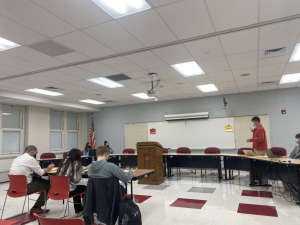Affirmative
December 8, 2021
Social media should filter the content on their site that could be harmful to our society. Social media is the main way false information is spread and without regulations, it is extremely detrimental to society. People make important decisions based on what they hear from social media, mainly because it is their only source of news, and with all of the false information being spread, their decision could be inaccurate and not a true representation of their beliefs or factual information as a whole.
Harvard Business Review states, “Social media spreads misinformation on elections, vaccines, and other public health matters.” Social media needs to ensure that the news people are posting is accurate and reliable, so that people can learn to educate themselves before establishing opinions on current events and politics. We are risking lives through dangerous games and trends that the internet advertises particularly towards young children and teenagers.
Challenges such as the tide pod challenge and salt and ice challenge influenced their followers into unintentionally harming themselves because they went unmonitored and unregulated. North Jersey.com reported that there were 39 poison control cases of people ages 13 to 19 in January of 2013 as a result of the Tide Pod Challenge, which involves kids ingesting tide pods. Another case of a harmful internet challenge was the Fire Challenge, where participants would pour flammable liquid, commonly isopropyl alcohol, onto their skin, then ignite themselves.
Gianne Gilpin, an 11 year old girl from St. Pete’s, became a victim to this challenge. She received 2nd degree burns all over her body and their home had also been destroyed in the fire. Without regulations for challenges such as these, we are putting lives in danger. It is also important to recognize that the youth is extremely active on social media and also the most easily influenced age group. They are extremely vulnerable and sensitive to what they see whilst scrolling on their phones and computers.
For that reason, social media should be regulated in order to protect the youth. Youth is the future of our nation, and we should be focusing on protecting them from the dangers of social media. According to the US National Library of Medicine, Of 719 individuals aged 14 to 24 years, 79% reported being exposed to suicide-related content.
Social media companies should be able to have the ability to prevent young, impressionable teens from seeing content that would encourage them to end their lives. We have all heard the heartbreaking stories about cyber bullying and its results that end in suicide. Regulations could have saved their lives. There is no evidence or argument that can disprove the idea that unregulated social media has led to self-harm and suicide. While it can be argued that social media cannot be fully blamed for one’s actions, it is evident that social media plays a fundamental role in the contribution to these harmful acts.
It is also unreasonable to argue that social media should not be regulated for the sole belief that a child’s actions are the responsibility of their parents. While a parent is responsible for their child, they cannot monitor every single action their child takes. They cannot control what influences their child and what media is presented to their child. That is simply the responsibility of social media companies.
Referring to the tide pod challenge that took over the internet, it is clear that the trend was the source of thousands of children harming themselves, not the parents. Social media was the source that influenced them into joining this trend, and thus if they have the power to influence they must hold the responsibility to monitor. Compare this situation to children at school. It is a known fact that while the child is at school, they are the school’s responsibility. What happens to the child at school, what the child learns or follows at school is the school’s responsibility, not the parent’s.
So, similarly, when a child is on social media, it is social media’s duty to protect the youth. Social media must be regulated in order to stop spreading false information, terminate the dangerous challenges, and protect the youth and the future.


